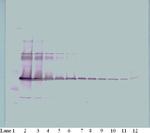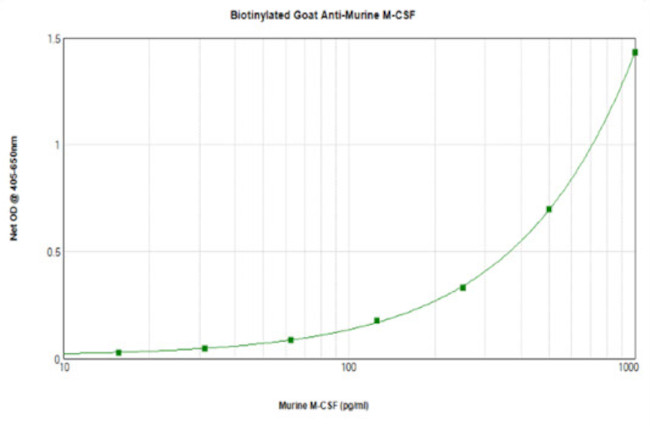Search Thermo Fisher Scientific
FIGURE: 1 / 3
M-CSF Antibody (500-P62GBT-25UG) in ELISA



Product Details
500-P62GBT-25UG
Species Reactivity
Host/Isotype
Class
Type
Immunogen
Conjugate
Form
Concentration
Purification
Storage buffer
Contains
Storage conditions
Shipping conditions
RRID
Product Specific Information
AA Sequence of recombinant protein: MKEVSEHCSH MIGNGHLKVL QQLIDSQMET SCQIAFEFVD QEQLDDPVCY LKKAFFLVQD IIDETMRFKD NTPNANATER LQELSNNLNS CFTKDYEEQN KACVRTFHET PLQLLEKIKN FFNETKNLLE KDWNIFTKNC NNSFAKCSSR DVVTKP.
Preparation: Produced from sera of goats immunized with highly pure Recombinant Murine M-CSF. Anti-Murine M-CSF-specific antibody was purified by affinity chromatography and then biotinylated.
Sandwich ELISA: To detect mM-CSF by sandwich ELISA (using 100 µL/well antibody solution) a concentration of 0.25-1.0 µg/mL of this antibody is required. This biotinylated polyclonal antibody, in conjunction with PeproTech Polyclonal Anti-Murine M-CSF (500-P62G) as a capture antibody, allows the detection of at least 0.2-0.4 ng/well of Recombinant mM-CSF.
Western Blot: To detect mM-CSF by Western Blot analysis this antibody can be used at a concentration of 0.1-0.2 µg/mL. Used in conjunction with compatible secondary reagents the detection limit for Recombinant mM-CSF is 1.5-3.0 ng/lane, under either reducing or non-reducing conditions.
500-P62GBT-1MG will be provided as 2 x 500 µg
Target Information
M-CSF (Macrophage colony-stimulating factor, CSF-1) is a survival factor essential for the proliferation and development of monocytes, macrophages, and osteoclast progenitor cells. M-CSF also induces VEGF (vascular endothelial growth factor) secretion by macrophages, thereby mediating mobilization of endothelial progenitor cells and neovascularization. M-CSF is present as several bioactive isoforms that differ in potency and stability. The full-length protein is synthesized as a membrane-spanning protein that can be expressed on the cell surface or further cleaved and modified in the secretory vesicle. Further, M-CSF is a disulfide-bonded homodimer which is processed into one of two isoforms, a glycoprotein or a proteoglycan that has been modified by the addition of chondroitin sulfate to each subunit. Binding of M-CSF to its receptor, c-Fms (CSF-1R or CD115) induces dimerization of the receptor followed by internalization and degradation of the complex. Functionally, M-CSF is known to stimulate differentiation of hematopoietic stem cells to monocyte-macrophage cell populations in culture. M-CSF acts through the CSF receptor 1. Although human M-CSF shows activity on mouse cells, mouse CSF shows no activity on human cells.
For Research Use Only. Not for use in diagnostic procedures. Not for resale without express authorization.
References (0)
Bioinformatics
Protein Aliases: CSF-1; H-MCSF; M-MCSF; Macrophage colony-stimulating factor 1; MGC31930; osteopetrosis; PG-M-CSF; Proteoglycan macrophage colony-stimulating factor
Gene Aliases: C87615; Csf1; Csfm; MCSF; op
UniProt ID: (Mouse) P07141
Entrez Gene ID: (Mouse) 12977

Performance Guarantee
If an Invitrogen™ antibody doesn't perform as described on our website or datasheet,we'll replace the product at no cost to you, or provide you with a credit for a future purchase.*
Learn more
We're here to help
Get expert recommendations for common problems or connect directly with an on staff expert for technical assistance related to applications, equipment and general product use.
Contact tech support
